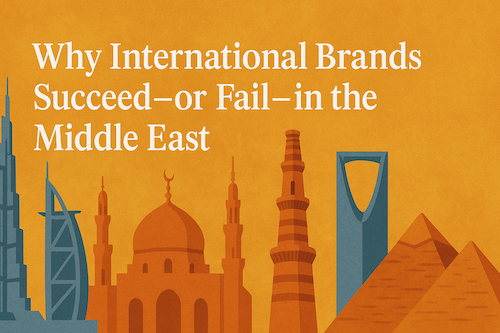By Mohammed Elbatta, Communications Strategist | 25+ Years in Reputation Management Across the Middle East
Entering the Middle East is often seen as a milestone for global brands seeking new growth markets. The GCC, in particular, with its young population, high digital penetration, and appetite for innovation, presents an alluring opportunity. But while the rewards are high, so are the risks. The truth is, international brands don’t just walk into this region and win—they earn their place. Some thrive. Others struggle. After more than two decades advising global companies across diverse sectors, I’ve seen both sides of the story. The difference often comes down to one thing: how deeply a brand is willing to listen, adapt, and commit.
More Than Translation: Understanding the Culture
The most common misstep brands make is assuming that success in Western markets can simply be replicated with Arabic subtitles and local PR. But entering the Middle East is not about language—it’s about cultural literacy.
This is a region where trust is built over time, where face-to-face relationships still matter, and where messages must align with local values and sensitivities. Brands that take time to understand religious holidays, societal norms, and generational dynamics are far more likely to resonate. Those that don’t risk becoming tone-deaf—at best—or culturally offensive—at worst.
Reputation is Built, Not Borrowed
Reputation doesn’t travel with your luggage. No matter how prominent a brand is globally, in the Middle East it must build its credibility from the ground up. This requires a localized reputation strategy that blends global standards with regional relevance.
This includes appointing local leadership or spokespeople who understand the market. It also means investing in meaningful, not performative, contributions—whether that’s job creation, sustainability initiatives, or partnerships with local entities. Brands that are seen as invested in the region’s progress earn goodwill. Those that appear transactional or opportunistic, don’t.
The Power of Relationships
In the GCC, business is not purely transactional—it is relational. The ability to build long-term, trust-based partnerships with government stakeholders, regulators, business leaders, and media is critical. One major difference between success and failure is how early a brand engages with these audiences—not just when something goes wrong, but proactively and consistently.
For example, I’ve seen brands that regularly brief local journalists and share regional success stories build a strong, resilient media narrative. Others that only communicate during a product launch or crisis remain unknown, or worse—misunderstood.
Managing Risk and Building Resilience
The Middle East is a dynamic environment. Geopolitical shifts, economic diversification, social transformation, and now digital disruption, are all moving fast. Reputation management here is not about playing defense—it’s about building a brand that’s agile and resilient.
That means preparing for crises before they happen. It means scenario planning, clear escalation protocols, and culturally competent crisis communication. Silence, ambiguity, or generic global statements don’t work here. What works is being human, responsive, and clear—while rooted in local context.
Strategic Adaptation Is Not Optional
The most successful brands treat the Middle East not as a satellite market, but as a strategic priority. They tailor their offerings, communications, and operations. In doing so, they don’t just sell—they connect. They don’t just operate—they contribute. And they don’t just protect their reputation—they enhance it.
A Final Word
For global brands, the Middle East is not a checkbox—it’s a commitment. Success here is built on cultural fluency, stakeholder trust, and strategic adaptability. It takes more than presence; it takes purpose.
The brands that win in this region are not just the biggest or the loudest. They are the ones that understand where they are, respect who they are speaking to, and stay grounded in both strategy and empathy.
If you’re looking to grow in the Middle East, the question is not just “Are we ready?” but “Are we truly listening?”




